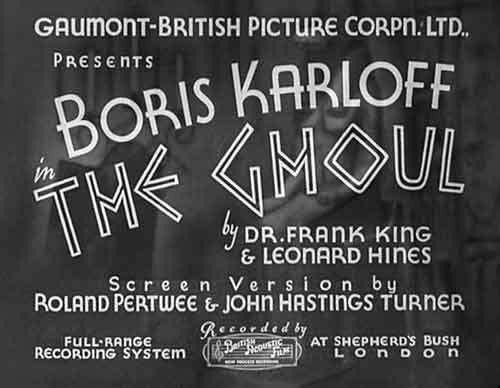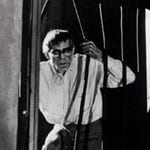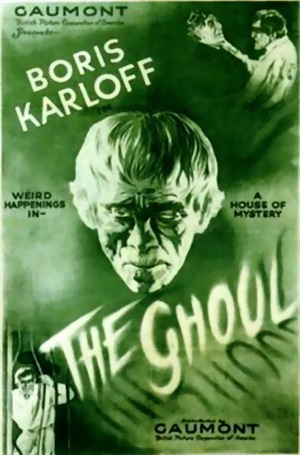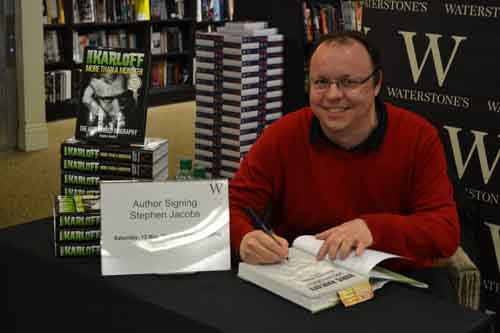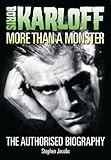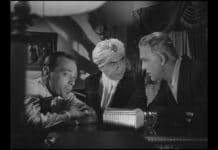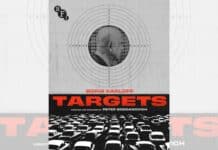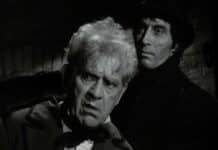Award-winning Boris Karloff biographer STEPHEN JACOBS marks the 80th anniversary of the horror star’s return to England to make his first British film, The Ghoul (1933)
Following the release of The Mummy in December 1932, Universal was in a quandary.
The studio had a worldwide renowned horror star in Boris Karloff but had no idea what to do with him, “and until (studio owner) Mr. Laemmle finds him a new crime worth committing, he must remain out of work,” reported Film Weekly. Fortunately Karloff was not out of work for long.
Early in 1933 Lord Lee of Fareham, a Gaumont-British executive, arranged for the loan of the horror star.
Karloff was thrilled by the prospect. “Suppose we dock at Southampton,” he said. “I shall charter a little car and point her nose toward Suffolk. We shall wander, dawdle over the lovely, fresh, green English countryside. We shall stop at little inns and we shall take walks. You do walk, you know, in England. People have tea at four or thereabouts, and then everyone gets out into the air. You can hop over a hedge and walk for miles over green, green fields that are almost like lawns. You should, of course, have a dog and a pipe and an old jacket. It is part of English life to take time to enjoy the quiet things.”
It would be his first visit to England since he had left for Canada back in 1909. He had considered visiting before but it had always been rather impractical. “When I was working, I couldn’t find the time,” he said. “When I wasn’t working, I couldn’t find the money.”
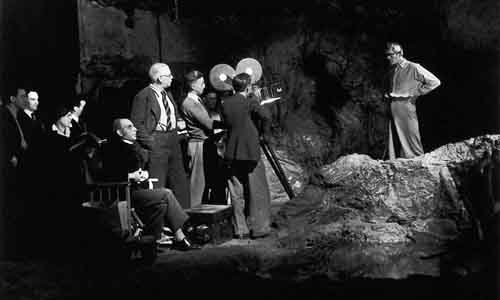
On 2 March 1933 Karloff and his wife, Dorothy, left for New York in a Ford tri-motor plane. They arrived two days later just as their ship, the S.S. Paris, sailed from the dock. A small boat ferried them across to it and they climbed aboard, the object of every passengers’ attention. “We were certainly two tired and disreputable-looking people,” said Dorothy. For the next week the couple relaxed in the luxury of their 1st class cabin, and took advantage of the ship’s entertainments – including a Punch and Judy show and a viewing of Rasputin and the Empress (1932).
Although he was thrilled to be returning, the thought had filled him with some trepidation. “We docked on a Friday night [10th March] and motored to London,” Karloff recalled. “I can’t tell you what the first sight of London did to me. Only if you have been away from a place for twenty-four years, can you understand. I was afraid that memory would play tricks on me — that things would have changed. But they hadn’t changed. At the first glimpse of an English bobby, I grew maudlin — just plain maudlin! It seemed as if I had been gone only a day. That first night in the hotel room, I didn’t sleep a wink. I simply sat by an open window until dawn — filling my eyes with the sight of it, my lungs with the odour of it. London! That was all I had the opportunity of doing for the next six weeks, for we started work on the picture the very next day.”
Karloff stars in The Ghoul 1933
Karloff had been contracted to star in The Ghoul. He would play Professor Morlant, a dying Egyptologist who believes he can gain eternal life through ‘The Eternal Light’, a jewel stolen from an Egyptian tomb. When Morlant is buried without the jewel he returns from the dead to seek revenge. Joining him would be Ernest Thesiger, his co-star from The Old Dark House (1932).
Although it was Karloff’s first British film, he was not having such a grand time, as his wife, Dorothy, revealed in a letter to her mother: “Boris as usual doesn’t like the story – or his part – and they’re having an awful time with the make-up,” she wrote. “He says the make-up man [Heinrich Heitfeld] doesn’t know anything about Boris’s type of work – is German besides and can’t understand a word Boris says. So it’s the same agony of starting a new picture even if it’s in England.”
When he was not working at the studio, Karloff spent much of the time socialising, visiting friends and family, and spending evenings at the theatre. At a press event for The Ghoul (held in London’s Piccadilly) Karloff had a reunion with three of his brothers: Edward, Frederick and Sir John Pratt.
“The meeting again with my brothers was quite different to what I anticipated,” he later said. “There is a little difference in my suddenly attaining fame, when my mature family had taken years to establish themselves in their respective diplomatic posts. But Jack immediately put me at my ease by saying ‘It’s simply grand, and we’re all delighted to see you come home in triumph!’ The 25 years we had been apart made a difference. The strangeness had to wear off. We had to find the common touch. Then there came that lovely sense of well-being, of deep understanding and warm friendship.” A curious Sir John asked his brother: “Tell me, Billy, how much do you get paid for this sort of thing you do?” When informed Sir John said, “Billy, save every farthing… this can never last!”
Yet the years away from his siblings had taken its toll. “When you haven’t seen a person for 24 years, he is different. He has become a stranger, even though he is a brother. For the first few days, my brothers and I chattered like magpies. Then conversation and recollections began to run low. When we tried to continue, we were struck by the fact that there was nothing more for us to say to each other. We had no common ground of experiences. Absence makes strangers of the closest relatives!”
There had been talk of a second picture in England but when it came to naught the Karloffs planned to return to Hollywood. First they embarked on a paid holiday. They visited Canterbury and Dover, then up to Warwick, Kenilworth, the Lake District, Windermere and the lowlands of Scotland. Then it was down to York and then on to Rutland, and a visit to Karloff’s old school. “I was there, luckily, for a cricket match,” he recalled. “I went to chapel in the morning and ate a meal in the big dining hall, just to see if the plum cake for dessert was as good as I remembered it. It was. So, too, were the buns I bought in the ‘tuck shop’ in the village. The ‘tuck shop,’ you know, was where we used to spend our allowances for the sort of things that boys like to eat.
When I was a boy, going there, we would meet men who had once attended Uppingham. Old, grey ghosts, they seemed to us. Colonels back from foreign service, middle-aged or elderly men from all walks of life. Fierce old gentlemen with bristling moustaches, protesting, crossly, ‘What’s that tree doing there? There was no tree there when I was here.’ We couldn’t imagine how those men had ever been boys, going to school as we were. I am certain that the boys I met held the same viewpoint. I was, to them, an old grey ghost!
I wish I had thought to wear a fierce military moustache for their benefit.” When their holiday was over the Karloffs headed back for Southampton where they boarded the Europa bound for New York. They were back in Hollywood by 19 May.
“My trip home — do you know that at times I used to dread it?” Karloff later said. “I felt that I should be disappointed in many ways.
My own capacity for appreciating things has changed. Yet, despite this feeling, I could not bear to think of not going, and now I am glad to have gone. The memory of it will last me another twenty-four years. It is strange that places, really, have a bigger pull on your heart-strings than people do. The places in which you grew up and acquired your first impressions of life and the world in general. Boyhood scenes.”
It had been a bittersweet experience. “There is a sadness about returning to remembered places, a sadness that often overshadows joy,” he explained. “But it is such sweet sorrow — if taken in small doses.” “However trite it seems,” Karloff concluded, “a truer line was never written than, ‘What do they know of England — who only England know?’”
Award-winning Boris Karloff historian STEPHEN JACOBS is the author of Karloff: More than a Monster. You can buy his book here from Amazon and read his interview with The Spooky Isles here. He also wrote an Spooky Isles article Karloff’s London, a location guide including Boris Karloff’s childhood homes and filming locations around the English capital.


